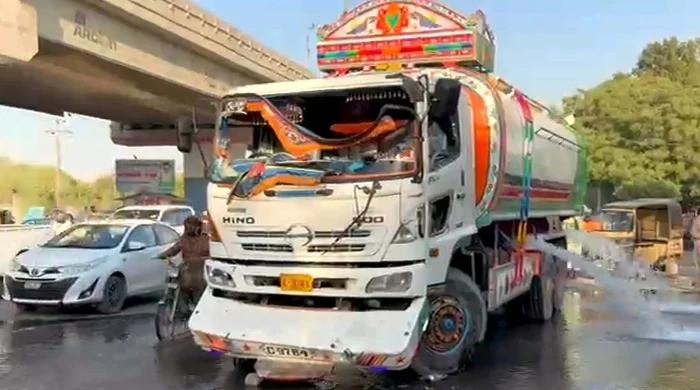Road Accidents Involving Heavy Vehicles Continue to Claim Lives in Karachi
Karachi: A motorcyclist lost his life after being struck by a water tanker in Gulshan-e-Iqbal’s Block 6, according to rescue services on Monday, highlighting the ongoing issue of accidents involving heavy vehicles. The victim has been identified as Karimullah.
This recent incident follows a string of fatal accidents, with three reported in the last 24 hours across Karachi. Other incidents occurred in Korangi, where a motorcyclist was killed by a vehicle, and in Shah Faisal No 2, where a motorcyclist died after a fall.
This death adds to the increasing number of deadly road incidents involving large vehicles in the city. Just the day before, a person died in Baldia Sector 8 after being hit by a speeding water tanker. Separately, in Baldia’s Naval Colony area, a dumper truck crashed into a rickshaw, injuring five individuals, including two women.
These events highlight the persistent dangers posed by heavy vehicles in the city, despite regulations. On April 14, a woman died when a bus collided with a motorcycle near Orangi Town No 5. Police reported the driver’s arrest and the opening of a case.
This year, over 100 people have perished in accidents involving dumpers and similar vehicles, raising concerns about the effectiveness of traffic management in the city.
In response, Commissioner Karachi Syed Hassan Naqvi recently ordered the installation of cameras and trackers on all heavy transport vehicles (HTVs), including dumpers, water tankers, and oil tankers.
This order followed the end of a strike by goods transporters that had affected port operations. The new rules require each HTV to have three cameras: front, rear, and inside to monitor driver behaviour.
Additionally, the Sindh government has limited heavy vehicle movement during daytime and imposed a 30 km/h speed limit within the city. Dumpers are now prohibited from roads between 10pm and 6am.
HTVs will also receive safety guardrails and trackers, with data accessible at the DIG Traffic office. Transporters have pledged to ensure vehicle roadworthiness within three to six months and to provide progress updates every 10 days.
While acknowledging these steps, transporter representatives have requested more time, citing the May 1 deadline for full compliance as impractical.
Despite these efforts, violations are still common. The DIG Traffic has reported increased enforcement, issuing 13,300 challans, registering 88 cases, and impounding multiple vehicles in the past week.
Under a new SOP, 11 roads are now off-limits to Xinqi and other 1+2 or 1+4 rickshaws. However, these vehicles continue to operate on these roads. Even with police present, enforcement is weak, and rickshaws operate freely.
Authorities are considering raising fines from Rs2,000 to Rs20,000, and are developing additional strategies. However, enforcement is hampered by issues like inadequate registration, unclear route permits, and the operation of larger rickshaws on routes meant for smaller vehicles.
Regarding heavy traffic regulations, enforcement is limited. While fitness certificates are required, licence verification is lacking.
The main challenge is operational necessity. Stopping essential services like water tankers could disrupt city-wide utilities. Therefore, while policies exist, their practical implementation remains limited.



Comments (0)
No comments yet. Be the first to comment!
Leave a Comment